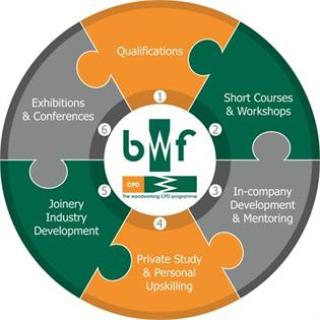 The British Woodworking Federation is delighted to announce the launch of the first CPD (continuing professional development) scheme for the joinery and woodworking industry. The scheme was launched Monday 8th October at the W12 exhibition at the NEC in Birmingham.
The British Woodworking Federation is delighted to announce the launch of the first CPD (continuing professional development) scheme for the joinery and woodworking industry. The scheme was launched Monday 8th October at the W12 exhibition at the NEC in Birmingham.
Run by the BWF’s Woodworking Industry Training Forum (WITForum), the CPD programme offers all those working within the joinery and woodworking industry the opportunity to develop new skills and to gain recognition for training and personal development. With the launch taking place yesterday, 11 of the most progressive organisations in the industry have already signed up to the scheme. Of these, the 9 joinery companies signing up at the launch ceremony were Howarth Windows & Doors, Westgate Joinery, Oakwrights, Parker & Highland Joinery, Arnold Laver Timberworld, Elmwood Joinery, the Performance Window Group, Tompkins Wood and Vicaima.

The scheme is free to BWF member companies. Businesses signing up to the scheme have put their names on a display at W12 in a public display of commitment, and will be encouraging all their staff to join.
Dave Campbell, Marketing & Training manager, says:
“CPD is critical to boosting the professionalism and economic success of our industry. It’s good news for individual employees, including those in non-craft occupations in the industry, because it provides formal recognition for everything they achieve in terms of professional development throughout their career. It’s also critical for employers, helping to support and build a stronger workforce of skilled employees in all occupations across the company.”
The Chartered Institute of Personnel and Development (CIPD) defines continuing professional development as a combination of approaches, ideas and techniques that will help someone manage their own learning and growth.
The BWF has built on this, forming a user-friendly framework enabling professional development to be accessible to all in the joinery and woodworking industry, whether they are an apprentice or the managing director. Through its simple and straightforward approach, those taking part can achieve professional development while continuing with their daily tasks.
The CPD programme creates the opportunity for participants to make their development personal and unique to them, as they choose the goals they want to achieve.
A record is kept of the learning and development hours they have attributed and are recorded in a log book, alongside evidence of their achievements. The number of hours needed to meet requirements is 30 per year, and hours can be recognised via six different areas:
1 . Qualifications
. Qualifications
2. Short courses and workshops
3. In-company development and mentoring
4. Private study and personal upskilling
5. Exhibitions and conferences
6. Joinery industry development
Anyone undertaking an apprenticeship in joinery-related subjects or a range of relevant qualifications will automatically be deemed to have achieved the 30 hours required, as well as those involved in selected qualifications offered elsewhere such as the Fire Door Inspection Scheme’s diploma in fire doors.
Otherwise courses, seminars, e-learning and distance courses will contribute towards the 30 hour target, as will in-company training, project work and management development, and even contributing to the BWF, attending its events and meetings, and participating in other industry-related initiatives.
Dave Campbell continues:
“Through taking part in the CPD programme, we know that workers will gain new skills, be more diverse, be a greater asset to their company and challenge themselves through strengthening their weaknesses.
“The benefits of the CPD programme to companies include employees gaining enhanced skills, and as the programme can link to any existing training and development plan, it will help the business to grow. Being provided with a formal recognition of development, backed up by the Construction CPD Accreditation Service, staff morale will also increase leading to improved productivity.”
The BWF’s training arm, the WITForum, was set up to raise skills, improve provision, improve recruitment and give the industry a voice on skills.